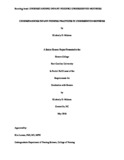UNDERSTANDING INFANT FEEDING PRACTICES IN UNDERSERVED MOTHERS
Author
Miskow, Kimberly Denise
Abstract
Abstract
Purpose: A program evaluation was conducted to assess the barriers and facilitators for breastfeeding among low-income, minority women.
Methods: The records of 54 postpartum women served by a local health department were audited for barriers and facilitators related to breastfeeding practice. Interviews of 5 key informants were conducted and local and state breastfeeding policies were reviewed.
Results: Among the 54 postpartum charts, 79.6% were Latino, and 20.4% were non-Latino. The women had an average age of 28 years and a range of 14-41 years. Only 54.8% of Latinos and 18.2% of non-Latinos (p=.031) had initiated breastfeeding at the initial postpartum visit (Healthy People 2020 goal for breastfeeding initiation is 81.9%). Most Latinos were single (79.1%), unemployed (76.7%), multigravida (88.4%), receiving WIC (90.7%), and delivered at the local community hospital (81.1%). Latinos were less likely to have a high school or post-high school education (19.5%) as compared to non-Latinos (80.0%, p=.001). Key informants revealed that major barriers included lack of maternal breastfeeding support, especially from grandmothers. Breastfeeding policies at the state and local levels lacked specific recommendations for breastfeeding duration.
Conclusions: Recommendations include incorporating American Academy of Pediatrics guidelines for breastfeeding and intentionally tracking breastfeeding status data at 6 months and increasing breastfeeding education and community outreach to increase widespread acceptance.
Keywords: breastfeeding, WIC, underserved mothers
Subject
Date
2016-05-02
Citation:
APA:
Miskow, Kimberly Denise.
(May 2016).
UNDERSTANDING INFANT FEEDING PRACTICES IN UNDERSERVED MOTHERS
(Honors Thesis, East Carolina University). Retrieved from the Scholarship.
(http://hdl.handle.net/10342/5583.)
MLA:
Miskow, Kimberly Denise.
UNDERSTANDING INFANT FEEDING PRACTICES IN UNDERSERVED MOTHERS.
Honors Thesis. East Carolina University,
May 2016. The Scholarship.
http://hdl.handle.net/10342/5583.
June 29, 2024.
Chicago:
Miskow, Kimberly Denise,
“UNDERSTANDING INFANT FEEDING PRACTICES IN UNDERSERVED MOTHERS”
(Honors Thesis., East Carolina University,
May 2016).
AMA:
Miskow, Kimberly Denise.
UNDERSTANDING INFANT FEEDING PRACTICES IN UNDERSERVED MOTHERS
[Honors Thesis]. Greenville, NC: East Carolina University;
May 2016.
Collections
Publisher
East Carolina University

